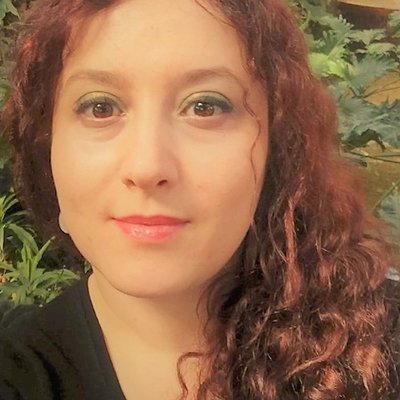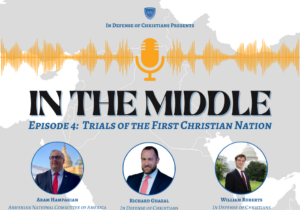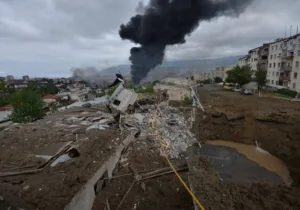For the past 3 years, the indigenous Armenians of the Republic of Artsakh (Nagorno-Karabakh) in the South Caucasus have undergone an aggressive war at the hands of Azerbaijan and its ally, Turkey. According to statements from Azeri state officials, this war’s purpose is to eliminate the Armenian presence in Artsakh. Azerbaijan’s President Ilham Aliyev, for instance, has repeatedly stated that Armenians in Artsakh “have two options: either they will live under Azerbaijani rule or leave.”
The war was launched on September 27, 2020 with the support of Turkey and lasted for 44 days. It involved the carpet bombing of cities and villages, the targeting of civilian populations, the recruitment of foreign terrorists from Syria, as well as the systematic perpetration of war crimes and human rights abuses. Azerbaijan used internationally prohibited weapons, and bombed hospitals, kindergartens, and houses during the war.
This aggression has resulted in the deaths of thousands of Armenians, the forceful capture of significant parts of Artsakh territory, the forced displacement of tens of thousands of civilians, as well as the ongoing detention and torture of an unspecified number of Armenian prisoners of war (POWs).
The current official yet approximate number of Armenian prisoners of war in Azerbaijan is 35. But this number keeps rising. Siranush Sahakyan, an attorney who represents Armenia at the European Court of Human Rights, said at a press conference on May 12 that are currently 80 POWs at the hands of Azerbaijan.
Although the trilateral agreement signed on November 9, 2020 meant to suspend the war, Azerbaijan has never ended its aggression. Azerbaijani Armed Forces have continued with unprovoked attacks on Armenian territory, including opening fire on Armenian soldiers carrying out engineering works in the Tegh Community on April 11, 2023, a hostile action which killed four Armenian soldiers and wounded six. Similarly, on March 5, 2023, Azerbaijani troops attacked an Artsakh police car, killing three police officers.
In a separate instance on May 29, 2023, two Armenian soldiers were captured by Azerbaijani forces in a cross-border incursion. The soldiers, Harutiun Hovakimian and Karen Ghazarian, were ambushed and kidnapped after they had delivered water and food to Armenian army units guarding the border with Azerbaijan.
According to unofficial data, around 5000 Armenian soldiers and scores of civilians have been killed by Azerbaijan since the 2020 war. To observe the grief and struggles of Armenian mothers who lost their children due to Azeri aggression, María Luciana Minassian, a human rights lawyer based in Argentina, visited the capital of Armenia (Yerevan) twice this year in March and May.
During those trips, she visited universities, government offices, as well as the Yerablur Military Cemetery, where the Armenian servicemen who lost their lives in defense of the homeland are laid to rest. Minassian also visited the Lachin Checkpoint on the Hakari Bridge recently launched by Azerbaijan and Armenian military positions.
“That was a fact-finding mission which gave me the possibility to get acquainted with the changes Azerbaijan made on the territory,” Minassian told this author in an interview.
“I was very worried that our soldiers were only 400 meters away from the Azerbaijani military positions. Because of the work I have been doing as a lawyer since the 2020 Artsakh War, I know the dangers those soldiers are facing. I felt extremely sad to leave them so close to a barbaric enemy. I know that any of our soldiers who get captured by Azeri forces are subjected to inhuman treatment and torture. I said goodbye to them and by the time I got in the car, I was in tears, devastated.”
Minassian says that the number of Armenian soldiers killed by Azerbaijan is not certain.
“Official statements from the Armenian government placed the number of dead soldiers during Artsakh’s war over 2900; but we usually speak about 5000 casualties.”
Sadly, this number has increased since the end of the war. In September 2022, for instance, Azerbaijan launched another unprovoked assault on sovereign Armenian territory, using combat drones, artillery and large caliber firearms, reportedly resulting in the deaths of dozens of soldiers.
“We have to take into consideration the approximately 95 victims of the September 2022 Azerbaijani aggression against the Republic of Armenia. We also need to take into consideration the identification procedures that are still being processed based on DNA. In many cases, we only have bone as a remnant of an Armenian combatant, and investigations must take place to identify the victim.
“I spoke to many mothers in Yerablur Cemetery. They were very kind and also extremely devastated. The cemetery is the home of everyone who lost a son in the war. I also spoke to the brother of a deceased combatant. He visits his brother’s grave every day and every night. He drives a cab, and in the middle of his work, if he feels like visiting, he stops and spends the rest of his day inside Yerablur. I invited him for lunch, as he was so kind that had offered to get me back to the city. He was so sad the entire lunch, but he was also surprised that his case was brought to my attention.
“When I was in Yerablur, I realized a military burial ceremony was about to take place. The burial ceremony was of a soldier who was identified only by a piece of bone. So it was a controversial case for the mother of the soldier, and it had taken a while to get the information.
“In a sense, the pain and the mourning of those families who lost a loved one during the war has only just begun; parents need to be heard. They gave their most precious treasure to the Armenian Motherland: their sons. And by now they are living lonely lives; many of them don’t work (they do not have the ability to do so). I also witnessed birthday celebrations inside Yerablur. I saw people wearing t-shirts with the fallen soldier´s picture, arriving at a grave, with balloons, and a beautiful cake. This scene is truly sad, very sweet, and filled with love. You get to feel the love, and you get to feel the sadness.
“Mothers only want one thing: they want recognition of their sons’ sacrifices because their lives were lost in territories we may not be allowed to visit for a while, or maybe for a lifetime. In order to honor the lives of these soldiers and their brave efforts, their mothers only ask us not to give up. They want us to continue the freedom struggle for the 120.000 ethnic Armenians who remain under Azeri siege and can´t freely exercise their right to live in their ancestral lands. I would add they also request what in Argentina has called “the right to know the truth”. That is, they are entitled to get informed about the whereabouts and circumstances in which their loved ones perished.
“When I think about the ongoing Azeri aggression, I also think about all the mothers who at this moment have their sons at the frontlines, at the borders. They are aware of the inhumane, atrocious way Azerbaijani forces treat kidnapped Armenians.”
It is not only Armenian men who are violently targeted by Azerbaijan. Armenian women soldiers have also been subjected to Azeri war crimes. One of the worst atrocities committed by Azerbaijan against Armenia concerns the rape, savage mutilation, and slaughter of a woman who served in the Armenian forces. The soldier was 36 years old and a mother of three children. The Armenian Ministry of Defense confirmed that Apetyan was killed during the Azeri assaults on September 13-14, 2022 along the Armenia-Azerbaijan border.
Author Raymond Ibrahim reported on the brutal murder and torture of Apetyan:
“A video of these atrocities, apparently made by the Azeri soldiers themselves, which was emailed to me, shows piles of mutilated and decapitated Armenian soldiers, including the woman in question. She appears naked, with both of her arms and legs cut off. One of her eyes is clearly gouged out. A severed finger appears sticking out of her mouth, and another appears to be sticking out of her private parts.”
Minassain said:
“We must also remember the lives of the women who served Armenia and gave their lives for the Motherland of the Armenians, some of them are also buried in Yerablur, including the ones who perished during the September 2022 attacks on the sovereign territory of the Republic of Armenia. When I was there, I paid my respects to them. I was also able to speak to one of the daughters of a killed Armenian woman soldier and she said she will host me in her house the next time I visit Armenia. I will be extremely honored to meet the relative of a brave female combatant. These heroes will remain in our hearts forever.”
Despite all international calls for de-escalation, Azerbaijan continues to flagrantly violate Armenia’s sovereignty, territorial integrity, international law, the political will and the right to self-rule of the Armenians of Artsakh, as well as the November 2020 tripartite statement signed by Armenia, Azerbaijan, and Russia to end the 2020 Artsakh War. It appears that the only way to stop the killings and torture of Armenians by Azerbaijan is for the civilized world to recognize Artsakh’s right to self-determination.
Garo Ghazarian, a human rights lawyer, and expert on international law, told this author in an interview:
“The criteria for people to have realized their right to self-determination is when they have either (a) established a sovereign and independent state, or (b) they have freely associated with another state, or (c) they have integrated with another state after having freely expressed their will to do so.
“While one of these acts is sufficient to trigger the right of self-determination, the indigenous Armenian population of Artsakh has realized all three.
“Therefore, if there truly is such a thing as an international community, it must not turn a blind eye to the exercise of these fundamental steps undertaken and practiced for the last three decades by the Armenians of Artsakh.
“And, to be clear, of all nations, the United States of America must lead in this regard.
“After all, it was U.S. President Woodrow Wilson during World War I promoted the concept of self-determination, whereby a nation made up of a group of people with similar political ambitions can indeed seek to create its own independent government and state.
“Can anyone seriously question the reality of the unjustifiable deprivation of human rights, and the plight of the Armenians of Artsakh today? I think not.”
It is high time that the United States, the leader of the Free World, took concrete action to stop this ongoing genocide against Armenians. All United States foreign and military assistance to Azerbaijan must be immediately ceased and the government of Azerbaijan must be sanctioned until it stops its attacks on Armenia and Artsakh. And for durable peace in the South Caucasus, the US government must recognize the right of self-determination of the people of Artsakh.







 Sponsor a student for Christianity & National Security 2024
Sponsor a student for Christianity & National Security 2024